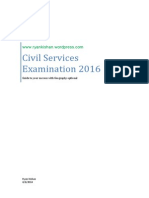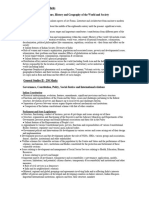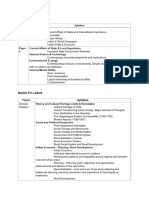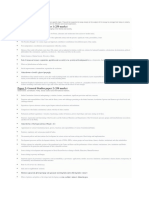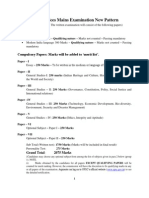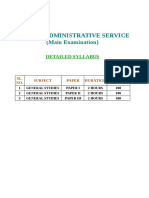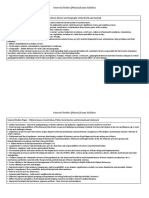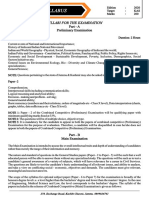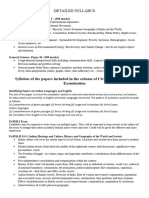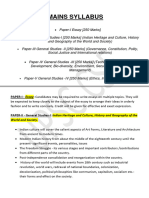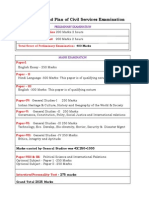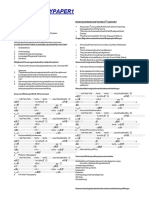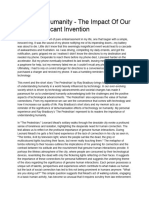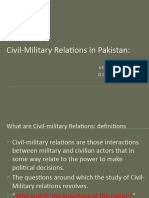Syllabus:
1. Cultural Heritage of India (select areas and topics)
GS 1 2. Modern History of India (beginning of the 19th century
onwards)
Maximum Marks – 250 3. Kadambas – Hoysalas
4. The Vijaynagar Empire (1336-1799)
Exam Duration – 3 hours 5. Modern Mysore (1799-1947)
6. Karnataka Freedom movement and Unification (1885-
3 Sections: 1956)
7. Post-Independence Karnataka
Cultural Heritage and History of 8. Social Change & Movements
Karnataka and India 9. Social Change & Modernisation
Political and Social Perspective 10. Political System and Government
Planning, Indian Economy, 11. Decentralization of Power
Rural Development- Data 12. Socio-economic system
Collection, Analysis and 13. Rural social system and Rural dev
Interpretation 14. Indian Economy
15. India and International Economic Relations
16. Development Patterns
17. Planning and Planning Goals
18. Decentralisation
19. Rural Dev
20. Rural Development Initiatives
21. Data Collection Analysis & Interpreta
Syllabus:
1. Lithosphere, Atmosphere, Hydrosphere
2. Continental physiography and demographic
distribution
GS 2 3. Indian Physiography
Maximum Marks – 250 4. Industrial Planning & Development
5. Physiographic divisions (Karnataka)
Exam Duration – 3 hours 6. Urban land use policy and Urbanisation (Karnataka)
7. Nature of the Indian Constitution
3 Sections: 8. Fundamental Rights
9. Distribution of Powers (Legislative)
Natural Resources and Physical 10. Unicameral and Bicameral legislatures
Features 11. Important Amendments
Indian Constitution – Overview 12. Welfare machinery in India
International Relations, Public 13. Union and State services
Administration and 14. Public and Private Administration
Managementtion 15. Organisation structure
16. Organisational behaviour and concepts of management
17. Informal and formal organisation
18. Management techniques and tools
19. Administrative Reforms
20. UN and Specialised agencies
� Syllabus:
1. Basics of Science and Tech
GS 3 2. Space Tech & Science
Maximum Marks – 250 3. Energy Resources
4. Disasters, Pollution and Pests
Exam Duration – 3 hours 5. Related Perception
6. Knowledge society
3 Sections: 7. Rural upliftment and Science & Tech
8. Natural Science
Role/impact of Science & 9. Agriculture Science
Technology in Indian 10. Sericulture and Horticulture
Development, Information 11. Biotechnology initiatives
Technology in Public Domain 12. Animal Husbandry (dairy, fishery and veterinary
Modern trends and sciences)
advancements in Life Sciences, 13. Development policies (Agriculture), programmes and
Natural Sciences, Agriculture trade
Science, Hygiene and Health 14. Hygiene & health
Issues/Challenges of 15. Environment Conservation
development on Ecology and 16. Natural Resources
Environment 17. Biodiversity & Ecosystem
18. Solid Waste Management & Environmental Pollution
19. Role of Information Tech in Environment and Human
Health
20. State-community-civil society in
Syllabus:
1. Ethics – determinants, essence and consequences
2. Ethics in public administration
GS 4 3. Accountability and ethical governance
Maximum Marks – 250 4. RTI and concept of public service
5. Human values
Exam Duration – 3 hours 6. Impartiality, integrity and non-partisanship
7. Aptitude and foundational values for civil service
3 Sections: 8. Emotional intelligence and contribution of social
thinkers
Ethics 9. (case studies on above)
Integrity
Aptitude
� Paper 1 Paper 2
Syllabus: Syllabus:
General Studies (National and International General Studies (State Importance) – 40
Importance) – 40 questions questions
Humanities – 60 questions General Science and Tech. Environment
and Ecology – 30 questions
General Mental Ability – 30 questions
The detailed KAS syllabus of Prelims Paper 1 is: The detailed KAS syllabus of Prelims Paper 2 is:
Current Affairs 1. Current events (State)
2. Important State Government schemes.
National and International Importance
3. General Science and Technology
Indian History Broad understanding as may be
expected of a well-educated
Broad understanding of Cultural, Social, person
Political and Economic aspects
Contemporary
Special Emphasis on Karnataka State issues/developments and
Focus on the Indian National Movement implications
Indian and World Geography 4. Environment and Ecology
Broad understanding of general
Focus on Karnataka issues on biodiversity, climate
change, ecology, health that do
not require a subject specialisation
Polity and Indian Economy
5. General Mental Ability
Indian Political System Basic numeracy
Economic Reforms Data interpretation (data
sufficiency, charts, tables, graphs
Rural Development and Poverty Alleviation
etc.)
Social Sector initiatives etc.
Logical reasoning and analytical
ability
Comprehension











